Summer School 2024 - more information

If you have any other questions, please email Summer School.
Chairs and speakers
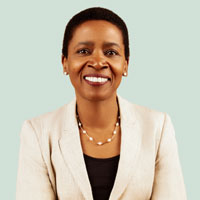
Professor Barbara Banda
Barbara is an educator, speaker, executive coach and author. Her book, 'The Model Black', has been hailed by the Financial Times as “a timely exploration of race in the workplace” and was shortlisted for the 2023 Business Book Awards.
With a dynamic career spanning industry, consulting, and education, Barbara collaborates with global organisations on complex projects, intertwining business strategy, leadership development, and organisational change. She infuses her work with vibrant energy, refreshing honesty, and unwavering purpose.
Barbara is a Visiting Professor at Rotterdam School of Management, an educator at Duke Corporate Education, and a Professor of Practice in strategy and leadership at Hult Executive Education.
In her earlier career, Barbara held senior sales and marketing positions with Fisons Pharmaceuticals, Boots Pharmaceuticals, Boots the Chemist and BASF Pharma, working across Europe, North America and Asia.
Barbara believes in our innate power to drive change through self-awareness, understanding, and knowledge. She champions the magic of effective dialogue to help us make more empathetic, inclusive and impactful decisions.
She coaches leaders worldwide, across diverse clients and contexts, working in the moment with sensitivity. Informed by her studies at the University of Oxford, Barbara champions the crucial link between management education and practical workplace application, breathing life into academic theory in refreshing and entertaining ways.
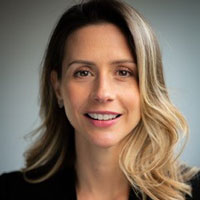
Natalia Bojanic
Connor Swenson Coaching Ltd
Natalia Bojanic has facilitated workshops in a wide range of settings, from charities to law firms and has worked with companies across different industries, such as lululemon, Amex and CancerCare. Her teaching background is diverse, combining ancient wisdom from Tibetan Buddhism with secular mindfulness from Search Inside Yourself, a Leadership Institute born at Google and developed by thought leaders in emotional intelligence, mindfulness and neuroscience. Natalia is currently studying for a Masters in the Psychology & Neuroscience of Mental Health at King's College London.
She is also co-founder of Form Nutrition, a B Corp using business as a force for good and a startup described by The Telegraph as a ‘game-changing’ brand. Previously she was a PR Director in the luxury industry, working for brands such as LVMH and Land Rover.
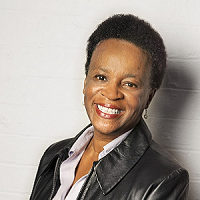
Professor Nelarine Cornelius
Professor of Organisation Studies, School of Business and Management, Queen Mary University of London
Nelarine Cornelius is Professor of Organisation Studies, School of Business and Management, Queen Mary, University of London.
Her work has been published in many international journals and handbooks. She co-led the research team that produced the report, Delivering Diversity, Race and Ethnicity in the Management Pipeline report (2017) on the experience of BAME managers in FTSE 100 companies (sponsored by the Chartered Management Institute and the British Academy of Management), and led the research team analysing experiences of race at work for Business in the Community, published in , ‘Voices from the Race at Work Surveys Report 2024’. She is currently undertaken research on social mobility in schools and in the workplace, funded by Santander UK.
She consults and advises widely across the private, public and social sectors, as well as undertaking ‘floor to board’ EDI reviews. Professor Cornelius is Vice-President of the Chartered Institute of Personnel and Development with responsibilities for Membership and Qualifications, and is led on the embedding of EDI learning into the new CIPD professional qualifications syllabi. Her work has been recognised by various institutions, including Fellowships of the Academy of Social Sciences and the Royal Academy of Arts.
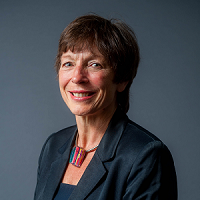
Jane Davidson
Chair of Wales Net Zero 2035 and author of #futuregen
Jane Davidson is Chair of Wales Net Zero 2035 and the author of #futuregen: Lessons from a Small Country - the story of how Wales became the first country in the world to legislate in the interest of future generations.
She is on a mission to mainstream sustainability. She lives on a smallholding in west Wales aiming to reduce her carbon and ecological footprints each year.
She is a patron of the UK Chartered Institute of Ecologists and Environmental Managers and Pro Vice-Chancellor Emeritus at the University of Wales Trinity Saint David. From 2000 - 2011, she was Cabinet Minister for Education, then Environment and Sustainability in Wales where she proposed legislation to make sustainability the central organising principle of government: the Wellbeing of Future Generations (Wales) Act came into law in 2015.
She introduced the pilot curriculum changes that are now enshrined in the new Welsh curriculum; the first plastic bag charge in the UK, the recycling regulations that have taken Wales to third best in the world, a Climate Change Commission for Wales, the post of Sustainable Futures Commissioner, One Planet Developments and the Wales Coast Path.
She is a RSA Urban Futures Commissioner and a regular contributor to the Executive Education for Sustainability Leadership programme at Harvard University's T.H. Chan School of Public Health.
Her guiding principle comes from John Rawls: ‘Do unto future generations what you would have had past generations do unto you.’
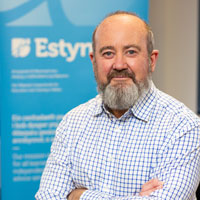
Owen Evans
His Majesty’s Chief Inspector of Education and Training in Wales
Owen Evans is responsible for the inspection of education and training in Wales, as well as the management, staffing and organisation of Estyn. He provides independent advice to Welsh Ministers which contributes to the development and review of policy in Wales. Owen also plays a key role in working closely with the other inspection, audit and regulation bodies in Wales, to underpin joint planning and working. In addition, as Estyn’s Accounting Officer he ensures that resources are used properly and provide value for money. The Chief Inspector also publishes an Annual Report on the standards and quality of education and training in Wales.
Welsh speaking, Owen was educated at Ysgol Penweddig and Coleg Ceredigion, Aberystwyth before graduating in economics from Swansea University. Owen joined Estyn from his position of Chief Executive of S4C, the Welsh language Broadcaster. Prior to joining S4C, he was Deputy Permanent Secretary of the Welsh Government, responsible for Education and Public Services. Between 2008 and 2010 he was director of Business in the Community Wales and for 10 years before that he worked for BT, including as a member of the UK team developing BT's broadband strategy. He has served as a member of the Welsh Language Board and previously chaired the Cardiff Education Development Board.
He is currently a member of Marie Curie's advisory board in Wales, is part of the Speakers for Schools programme and chairs WEPCo. He is a member of Aberystwyth University's Council.

Dr Jeremy Evas
Head of Prosiect 2050, Welsh Government
Dr Jeremy Evas is Head of Prosiect 2050 at the Welsh Government.
Prior to this, he was Head of Welsh Language Promotion and Behaviour Change at the Welsh Government and a lecturer in language policy and planning at the School of Welsh, Cardiff University. He was also Director of Strategy at the Welsh Language Commissioner, and Director of Policy and Corpus Planning at the former Welsh Language Board.
His main interests lie in finding and activating behavioural triggers for increasing the use of Welsh. He’s supervised doctoral theses on translation automation, and behavioural psychology as applied to human computer interaction in bilinguals, and to choice architecture of Welsh-medium services/education. He’s also published research on the factors that affect the intergenerational transmission of Welsh. At the Welsh Government, he’s responsible for programmes to increase the informal use of the Welsh language in school age children, Welsh language transmission and use in families, Welsh language technology, the Welsh language in the private sector and aspects of Welsh as a language of work. He implements the Leading in a Bilingual Country leadership programme with Academi Wales and facilitates at Academi Wales’ Summer and Winter Schools. Outside work, he’s normally to be found on his bike.
He’s a Fellow of the Higher Education Academy, a Member of the Association of Welsh Translators and Interpreters, a Chartered Linguist, and a Fellow of the Chartered Institute of Linguists.

Emmanuel Gobillot
Described as ‘the first leadership guru for the digital generation’ and ‘the freshest voice in leadership today’, Emmanuel has advised organisations across the globe on developing leaders, establishing teams, and changing cultures.
One of Europe’s most sought-after leadership speakers, he is the author and co-author of 7 UK and US bestselling books, the latest of which ‘This is Not a Leadership Book’ published by Routledge has sealed his place as one of the world’s foremost management thinkers.
For over 20 years his work has been based on his mantra – ‘there must be a better way and together we can find it’.
A French national, Emmanuel moved to the UK in 1985. He holds an International Baccalaureate from the United World College of the Atlantic, a MA (Hons) from the University of St. Andrews and a Diploma in Management Science from the Nottingham Trent University. A father of two, now adult, children (Charlotte and George) Emmanuel lives in London with his wife Katherine Thomas.
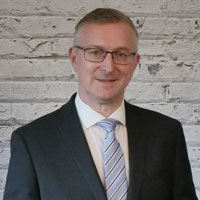
Dr Andrew Goodall
Permanent Secretary, Welsh Government
Dr Andrew Goodall was appointed to the role of Welsh Government Permanent Secretary in November 2021 and leads the Welsh Government Civil Service in delivering the priorities of the First Minister and acts as the Principal Accounting Officer for the Welsh Government. Prior to this he was Director General of Health and Social Services/Chief Executive NHS Wales, a position he had held since June 2014.
Dr Goodall has been an NHS Chief Executive in Wales for 16 years. Previous posts include Chief Executive of Aneurin Bevan University Health Board, a position held from the Health Board’s inception in October 2009 until 2014 after NHS re-organisation to the integrated Health Board model. During his 30 year NHS career, Dr Goodall has held planning and operational positions across a number of NHS organisations across South Wales as well as national roles. He has particular areas of interest in improving patient safety, quality and patient experience; partnership working and collaboration across Public Services; and delivering frontline services through service improvement and modernisation.
Dr Goodall has a law degree from Essex University and a PhD in Health Service Management from Cardiff Business School. Dr Goodall was awarded a CBE in the 2018 New Year Honours for his services to the NHS and public services

Ian Govier
Academi Wales
Ian works for Academi Wales, Welsh Government, runs his own leadership development and coaching business, and returned to the NHS during the COVID-19 pandemic where he worked on a part-time basis as a staff nurse. He has held senior leadership and management positions in a variety of organisational settings, has presented many innovative papers on leadership, coaching and mentoring at UK and European Conferences, as well as in journal publications, and previously served as an officer in the Army Medical Services.
Ian’s approach to life is to ‘live each day with purpose, faith and passion and be teachable and always keep learning’; he strives to achieve a healthy life balance through activities that include playing the piano and guitar, singing, acting, volunteering, bird watching, hill walking and fly fishing.

Anoup Kerrai
Microsoft
At Microsoft, my role as a Senior Azure Technical Specialist revolves around nurturing Data and AI innovation and culture across the Public Sector. Harnessing data and AI strategy to architect solutions that align with organizational goals built with data governance and responsible AI practices.
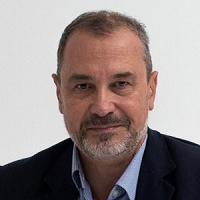
Tim Moss
Chief Operating Officer and Director General for Corporate Services and Inspectorates, Welsh Government
Tim was appointed as the Chief Operating Officer in September 2022, and has responsibility for a range of corporate functions including Finance, Treasury, HR, Estates, Security, legal, Digital Data and technology, Commercial and Procurement as well as oversight for three independent inspectorates, Care Inspectorate Wales, Health Inspectorate Wales and Planning and Environment Decisions Wales.
Before joining Welsh Government, he was the Chief Executive at the Intellectual Property Office, where he was responsible for advising Ministers on all IP policy matters and for the operation of the Office.
Tim came to the IPO from Companies House where he was the Registrar of Companies for England and Wales and Chief Executive. He worked at Companies House from 2002 where he held many senior positions within the organisation. His extensive work portfolio included leading on the digital agenda, operational delivery, business strategy and corporate policy.
Tim’s career also includes 12 years in senior operational roles in the manufacturing industry; he has a Natural Sciences degree from Cambridge University, an MBA from Swansea University. Tim lives on a farm in South Wales and is married with two children. He was awarded a CBE in the 2016 Queen’s Birthday Honours list for services to the economy and the people of Swansea.

Neil Mullarkey
Communication expert
Neil Mullarkey is a unique communication expert. You may recognise him from his performances in 'Whose Line Is it Anyway' and two 'Austin Powers' movies. He still performs most Sundays with the Comedy Store Players, Europe's top improv troupe, which he co-founded with Mike Myers. But he now travels the world bringing the skills of theatre and especially improv, focusing on creativity, collaboration and leadership to clients including EY, Deloitte, Vodafone, Accenture and Unilever.
His new book, 'In The Moment' has been nominated for the 2024 Business Book Awards.
Matt Brittin (President of Google, Europe, Middle East, Africa) says, ‘Neil’s model and how he applies it in different ways is really simple yet powerful. In a world that's more volatile and uncertain than ever, businesses need leaders who can be agile, adaptive, innovative. Neil's always promoted this brilliantly, but without the business jargon. ’
Visit http://neilmullarkey.com/ for more information. (And, yes, Mullarkey is his real name)

Dr Phil Renshaw
Coaching On the Go
Dr Phil Renshaw started his career in international banking and treasury, going on to become a Finance Director in the IT sector. It took 20 years before the penny dropped and he realised that a singular focus on “the numbers” is not the route to business and organisational success, but rather the recognition that it is ‘”all about the people”. As Phil moved into the field of leadership and development, he had another lightbulb moment – our efforts to instil the skills of coaching into leaders and managers is wasting huge amounts of time and money because we are failing to understand that a leader-who-coaches does not use their skills in the same way as professional coaches. Rather, they are coaching on the go.
Phil’s mission, alongside his business partner and co-author Dr Jenny Robinson, is to free us all to become leaders-who-coach. They have developed a research-based innovative and globally unique tool for anyone to develop these skills. As Marshall Goldsmith said of their book: "Successful leaders achieve change through effective coaching. This book shows you how, starting today." Delegates will receive a free copy of our book ‘Coaching On the Go’.
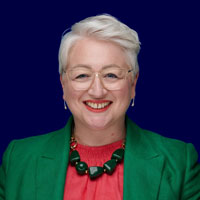
Kelly Swingler
The Burnoutologist
Kelly is the Burnoutologist, empowering Leaders to Banish Burnout in the changing world of work for themselves and their people.
Known for being a rebel and a rulebreaker, Kelly has been ripping up the rulebook since 2002 after realising that the way we are working isn't working, and how we are taught to define success is outdated.
When we live and lead from our truest self we can enjoy being successful on our terms and in our own way, without guilt, exhaustion and Burnout.
Today, Kelly helps leaders all over the world to succeed without giving up their careers or jeopardising their wellbeing by recognising that they are people too, which in turn creates better places to work for everyone…
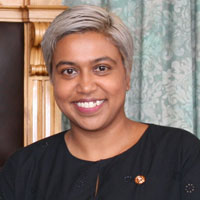
Shereen Williams MBE OStJ DL
Chief Executive Officer of the Local Democracy and Boundary Commission for Wales (LDBCW) and Secretary to the Boundary Commission for Wales (BCW)
Shereen Williams MBE OStJ DL currently serves as the Chief Executive Officer of the Local Democracy and Boundary Commission for Wales (LDBCW) and Secretary to the Boundary Commission for Wales (BCW). Her career has spanned across various sectors, ranging from electoral reform, community cohesion, and public service.
Over a period of 4 years, she spearheaded an ambitious all-Wales electoral review program, leading to the most extensive changes in local government electoral arrangements in over two decades which was followed by the 2023 Parliamentary Constituencies Review which culminated in the establishment of Wales' 32 new parliamentary constituencies. She is due to begin the Senedd Constituency review later this year when LDBCW is repurposed into the Democracy and Boundary Commission Cymru.
Prior to this, she worked in local government for nearly a decade across Newport and Monmouthshire Local Authorities as the Connected Communities Manager and before that as the Regional Community Cohesion Co-ordinator for East Gwent. The team she managed were responsible for the delivery of strategic priorities including migration, counter extremism and equalities.
Over the past 17 years, she has volunteered in numerous roles in the Third Sector as well as for statutory bodies and is currently a trustee of St John Ambulance Cymru and the Institute of Welsh Affairs. In 2010, she received a Welsh Government Recognising Achievement Award for services to Community Cohesion from the then First Minister of Wales, Rt. Hon. Carwyn Jones AM. In 2017 she was awarded an honorary MBE for community service and in 2018 she was recognised by the Association to Advance Collegiate Schools of Business (AACSB) in their Influential Leaders Challenge, which honours notable international alumni from AACSB-accredited business schools. Following her admission as an Officer of the Order of St John in Feb 2020, she was appointed as Deputy Lieutenant in Gwent in November 2021.
In 2023, she was invited by Welsh Government to Chair the Democratic Health Task and Finish Group which to explore the challenges faced by Community and Town Councils on engagement and participation.
In her free time, she sits as a magistrate on the Gwent bench and is a governor of two Welsh medium primary schools in Newport.
Apply for Summer School
Submitting your application
We have a limited number of places on this programme, which will be awarded through a competitive selection process. It's important that you submit strong objectives and outcomes which align to both you and your organisation.
In order to ensure that the delegate group benefits from a relevant mix of experience we use a number of criteria to sift applications including motivation for applying and how applicants will apply the learning to benefit themselves, their organisation, and the wider public service, consideration is also given to sector and regional representation.
Places will be awarded to those applicants who provide strong objectives for participating in the Summer School and can evidence their return on investment.
Please answer the following questions in your application:
- Personal Objectives - Please succinctly describe your current leadership role and responsibilities (min 100 words - max 150 words)
- Departmental/Organisational Objectives - What are your learning objectives for Summer School? (min 100 words - max 150 words)
- Personal Outcome Statement - How will Summer School help address the challenges in your work? How will you apply the learning? (min 100 words - max 150 words)
Learning objectives
Learning objectives are statements that describe significant and essential learning that learners have achieved and can reliably demonstrate after Summer School. In other words, learning objectives identify what you will be able to do by the end of the programme.
Learning objectives should:
- Reflect essential knowledge, skills or behaviours
- Focus on results of the learning experience
- Reflect the desired outcome from the event, not the means or the process
- Be a minimum of 100 words and a maximum of 150 words
Example of what is appropriate in an application –
As a Head of Service in the authority, part of my role is in building more effective (and collaboratively developed) public services. I need to be able to fully engage my stakeholders and my team to help take forward this agenda. I aim to build my skills by gaining insight into the tools and techniques that can help to effectively engage others.
This objective is a key part of my personal development plan and will be measured as part of my overall performance. Upon returning to work after Summer School, I will review my learning with my manager and consider how he can support me to complete any actions.
I am keen to hear more about Emmanuel Gobillot’s work around employee engagement and well-being; particularly in light of the challenges my team faces in delivering our business objectives over the next couple of years.
At the end of the Summer School week, I intend to create an action plan to help me translate the week’s learning into action using the tools and techniques I learn, along with good practice, new thinking and peer support. I will meet with my Chief Executive to feedback on both Summer School and my action plan in July.
Example of what is not appropriate in an application –
I expect to improve my engagement skills at Summer School by taking part in various learning opportunities and listening to the speakers.
It is important for me to have these skills to enable me to do my job.
The Summer School programme looks really interesting and a number of the sessions should help me with my learning and development.
Personal example
Example of what is appropriate in a personal example –
As a result of attending Summer School, I will clearly understand my engagement skills, including my strengths and areas for improvement.
This information, along with my personal action plan from Summer School, will help me assess my progress in this area over the next 12 months.
This will also be discussed and measured as part of my development review process with my manager.
Example of what is not appropriate in a personal example –
I would like to attend Summer School so I can become a more engaged leader.
Organisational example
Example of what is appropriate in an organisational example –
As a result of attending Summer School, I will be able to use a variety of tools and techniques to better engage others in the process of service development and delivery, encouraging stakeholders, communities and key individuals to feed into this and own the results. This is particularly relevant for my work with emergency teams in Mid Wales, considering how we can develop a more responsive, cohesive service relevant to the communities within the region.
In July, I will provide my team with a session to share the tools and techniques learnt at Summer School and build these into our team plans for taking forward our key business objectives.
Example of what is not appropriate in an organisational example –
I want to get better at engaging others and Summer School will hopefully give me the skills to do this.
Find out more and apply by Wednesday 22 May 2024.
If you have any other questions, please email Summer School.
Delegate fees
How much does it cost?
£600 + VAT. This includes:
- Access to the full Summer School learning programme
- Delegate pack
- Accommodation (nights of Tuesday 25 to Thursday 27 June 2024)
- Breakfast, lunch and evening meal during the event
You must meet any personal incidental costs, such as travel to and from the event, newspapers, bar bill and so on.
Please note: if you accept a place at Summer School and then withdraw from the programme, your organisation may be required to pay the full cost.
Bursaries
We are offering a limited number of bursaries to cover 100% of the delegate cost of Summer School 2024. We encourage applications from underrepresented, minoritised, and disadvantaged groups and/or where employing organisations have limited funds.
To apply for a bursary
Please provide evidence that you meet the eligibility (50 to 100 words). Your response needs to align to the criteria below:
- You are part of an underrepresented, minoritised, or disadvantaged group within your organisation, and/or your organisation has limited funds.
- The size of your organisation.
How do I pay? What information is required?
Billing for Welsh public service and third sector applicants
Academi Wales is part of Welsh Government. You must provide the following details in your application:
- Full name of organisation paying your delegate fee
- Name and address of billing contact
- Email address of billing contact
Supplier: Welsh Government
Supplier address: Welsh Government, Cathays Park, Cardiff CF10 3NQ
To confirm your place, you must provide us with a purchase order (PO) number. We will invoice your organisation for your delegate fee after Summer School.
Payment can also be made by business credit card via Gov.pay.
If you need further details on the invoicing requirements please contact our finance team at AW.Business@gov.wales.
Billing for Welsh Government applicants
Academi Wales is part of Welsh Government. You must provide the following details in your application:
- Branch finance manager email address
To confirm your place, your branch finance manager must provide the following details to AW.Business@gov.wales:
- Profit centre / Cost centre
- WBS code
- Your 6-digit staff / payroll number
We will issue a journal transfer to collect your delegate fee after the event.
Please note: not providing the appropriate finance information could put your delegate place at risk.
If you need further details on the journal transfer requirements please contact our finance team at AW.Business@gov.wales.
Prepare for Summer School
Timetable
Tuesday 25 June
- 9:30am to 11:30am: registration and accommodation allocation
- 12:00pm: lunch
- 1:00pm: programme begins
Friday 28 June
- 12:30pm: programme ends
Frequently asked questions
Do I have to stay for the whole week?
Summer School has been developed as a 4-day immersive learning experience. You will only get the full benefit of this opportunity by completing the whole week.
What if I live locally to the university? Does it have to be residential?
We encourage delegates to see the course as residential. However, if you live locally you may prefer to commute to and from your home. All delegates are expected to attend every day to make the most of the learning. Please let us know as soon as possible if you don't need accommodation.
Are childcare or crèche facilities available at Summer School?
There are no childcare or crèche facilities available at the University. Delegates will be expected to make their own childcare arrangements.
Meals and refreshments
Meals and refreshments are included within the programme (however alcohol, bar or café purchases are not covered).
- Breakfast: between 7:00am and 8:30am
- Dinner: 7:00pm
What do I do if I have a special dietary or other medical requirement?
We will gather this information as part of the application process. Please advise as directed if you have a medical or specific dietary need. With regard to dietary preferences, please note that the University serves a variety of food. There is also a supermarket within walking distance of the campus.
Mobile/internet connections
Please be aware that because of the location, mobile phone and internet signals may be patchy and could be affected by weather conditions.
Wifi is available in the main hall.
What’s useful to pack?
- Toiletries, hairdryers etc
- Flip flops/slippers to wear in the accommodation blocks
- A mirror
- General supplies may be useful tea, milk and biscuits, as the accommodation has kitchen areas (however, all other food and refreshments are provided during the event)
Dress code
Smart casual.
Photography/video recording
We will be taking photographs and seeking feedback and quotes throughout the event and the materials produced may be shared on our website and social media or used for future Academi Wales event marketing and training purposes. You will have the opportunity to agree to be featured in these materials or to opt out when you complete the application form.
Welsh language
Summer School is delivered in English. However, delegate packs and materials are provided bilingually, and simultaneous translation is available in the plenary room. If you would prefer to join a Welsh-speaking facilitation group, please state this in your application.
Personal preparation
Where applicable, you must complete all pre-work set by the speakers.
Delegate hub
Successful delegates will be invited to enrol onto the Summer School Delegate Hub. This is a secure closed site and can be accessed anytime, anywhere and on any device. The Hub will provide the opportunity to share important information leading up to the event, have discussions and network with your fellow delegates.
It is important that you log onto the Hub to receive regular updates and key information about the programme. We recommend you click the Subscribe button, and select the As they happen option to ensure you get the latest information as it is shared.
You will require an up to date web browser such as Microsoft Edge or Google Chrome to access the delegate Hub.
Travel
Travelling to Lampeter (external link)
Trains - Transport for Wales (external link)
Bus Timetables (external link)
Car sharing
Once the delegate list is confirmed, with your approval we'll share contact details. You can then make your own car sharing arrangements for travel to and from the event.
Contacts
If you have any other questions, please email Summer School.

